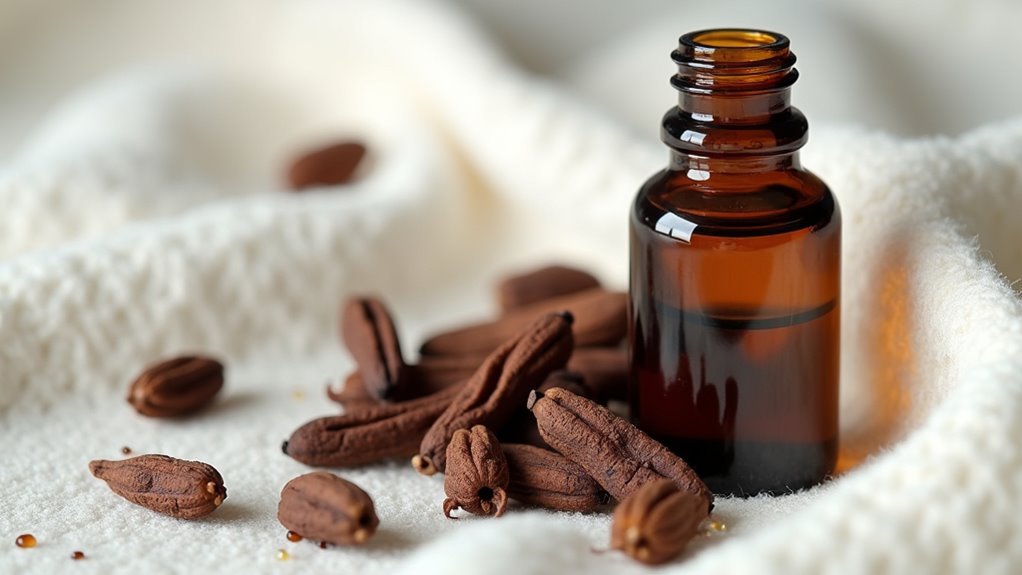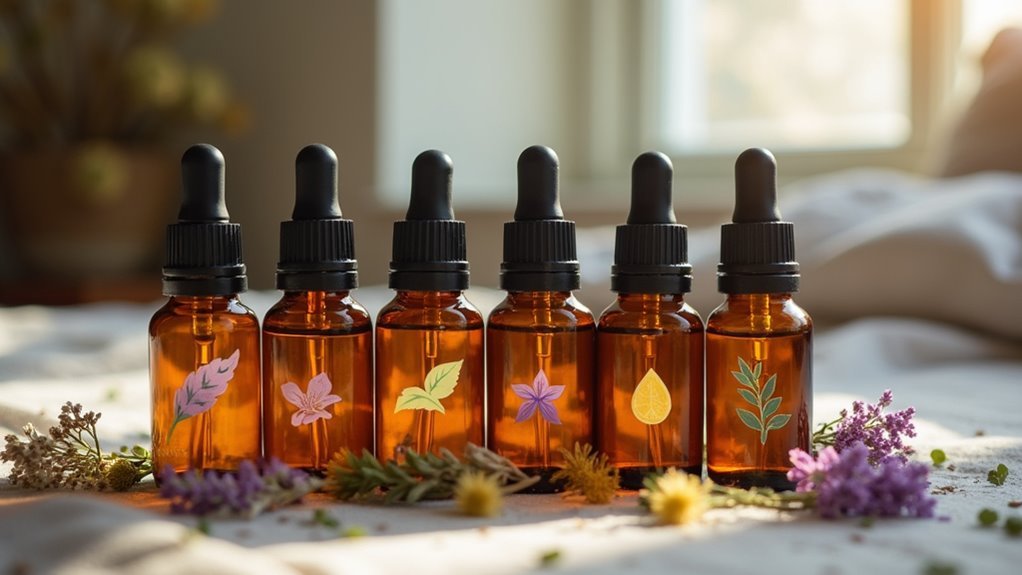You can effectively repel bed bugs using seven powerful essential oils: thyme oil disrupts their nervous systems, oregano oil interferes with reproduction, citronella prevents egg laying, clove oil kills on contact, tea tree oil penetrates their exoskeletons, lavender provides dual pest control and sleep benefits, and peppermint disorients bugs while cooling bite irritation. These natural alternatives create hostile environments for bed bugs without harsh chemicals contaminating your bedroom. Proper application techniques maximize their effectiveness against infestations.
Thyme Oil (Thymol): The Nervous System Disruptor

While synthetic pesticides dominate the market, thyme oil offers a powerful natural alternative that targets bedbugs through a completely different mechanism. The secret lies in thymol, thyme oil’s active compound that directly attacks bedbug nervous systems.
When you apply thyme oil, thymol overwhelms these pests’ neural pathways, creating an effective repellent barrier that can even prove fatal to bedbugs.
You’ll need considerably lower concentrations compared to synthetic insecticides, making thyme oil an environmentally friendly choice. Use it in spray form or diffusers to create inhospitable conditions for bedbugs.
Focus your applications on critical areas like mattresses and bedding, applying regularly to maintain a bedbug-free environment. This natural approach protects your home without harsh chemical exposure.
Oregano Oil (Carvacrol): The Powerful Bed Bug Deterrent
Another powerhouse in the natural bed bug control arsenal, oregano oil delivers carvacrol as its weapon of choice against these persistent pests.
You’ll find this compound overwhelms bed bugs’ nervous systems while requiring lower concentrations than synthetic alternatives to achieve comparable results. When you use oregano oil as a fumigant, it disrupts bed bug behavior and reproduction, creating an inhospitable environment for infestations.
You can apply diluted oregano oil as a spray on bedding, furniture, and cracks where bed bugs hide.
This effective solution works best when you incorporate it into integrated pest management strategies. Combining oregano oil’s natural pest control properties with other methods gives you extensive bed bug protection that’s both powerful and environmentally conscious.
Citronella Oil: Beyond Mosquito Protection

You’ve likely used citronella oil to ward off mosquitoes, but this versatile essential oil also packs a punch against bedbugs through its fumigating properties.
The key lies in understanding proper application methods and dilution ratios to maximize its effectiveness while maintaining safety in your home.
Let’s examine how citronella’s active compounds create an environment that bedbugs simply can’t tolerate.
Citronella’s Bedbug Fumigating Properties
Though citronella oil’s earned its reputation as a mosquito deterrent, it’s equally powerful against bedbugs lurking in your mattress and furniture. This essential oil disrupts their life cycle while its overwhelming citrus scent interferes with their ability to find food sources and mates.
You’ll find citronella oil particularly effective when fumigating infested areas, as it prevents bedbugs from laying eggs in treated environments. Mix it with water and rubbing alcohol for enhanced results when targeting surfaces.
| Problem | Citronella Solution |
|---|---|
| Active infestations | Disrupts bedbug life cycles |
| Future breeding | Prevents egg laying |
| Hidden bedbugs | Overwhelms their senses |
| Surface contamination | Spray application works |
While excellent for repelling bedbugs, combine citronella with thorough pest management for severe infestations.
Application Methods and Dilution
If you’re applying essential oils directly to your skin, proper dilution with a carrier oil is vital to prevent irritation.
The strong scent of citronella oil doesn’t just repel bed bugs—it can actually fumigate them, providing dual-action pest control that maintains protection against future infestations.
Safety Considerations and Effectiveness
While proper application techniques maximize citronella oil’s potential, understanding its safety profile and realistic effectiveness helps you make informed decisions about bedbug control.
You’ll find citronella oil safer than synthetic insecticides, but safety considerations remain important. Always dilute properly to prevent skin irritation, and keep concentrated oils away from children and pets who might ingest them.
Regarding efficacy, citronella oil can repel bed bugs through scent disruption, but don’t expect synthetic-level results. Essential oils like citronella require frequent reapplication and work better as preventative measures than elimination tools.
You’re creating barriers rather than achieving complete eradication. While citronella disrupts bedbug nervous systems and deters nesting, combining it with other control methods provides more reliable protection against established infestations.
Clove Oil (Eugenol): The Natural Bed Bug Killer

When you’re dealing with stubborn bed bug infestations, clove oil’s active compound eugenol doesn’t just repel these pests—it actually kills them on contact by disrupting their nervous system.
You can apply this potent natural pesticide directly to surfaces or mix it into a spray solution for targeted treatment throughout your home.
Understanding eugenol’s lethal properties and proper application methods will help you maximize its effectiveness against even the most persistent bed bug problems.
Eugenol’s Lethal Properties
Although synthetic pesticides dominate the market, eugenol—the powerhouse compound in clove oil—delivers a lethal one-two punch against bed bugs that’s catching researchers’ attention.
You’ll find this natural compound doesn’t just repel these pests; it systematically attacks their nervous system, causing rapid mortality upon contact. Unlike other essential oils that merely deter insects, eugenol actively disrupts bed bugs’ neurological functions, making it a true killer rather than just a repellent.
When you apply clove oil containing high eugenol concentrations, you’re weaponizing nature’s own insecticide.
Studies confirm that exposed bed bugs experience swift nervous system failure, making eugenol one of the most promising natural alternatives to synthetic chemicals in pest control strategies.
Application Methods Explained
Since clove oil’s lethal properties against bed bugs are well-established, you’ll need to master proper application techniques to maximize its effectiveness. Among essential oils, clove oil stands out for repelling bed bugs when applied correctly.
Mix clove oil with carrier oil or water to create an effective spray solution. Target infested areas systematically, focusing on mattresses, furniture joints, and cracks where bed bugs typically hide.
The application methods require consistent treatment schedules for ideal results. Spray directly into crevices and hotspots where infestations concentrate. You’ll find that regular applications help repel and kill bed bugs more effectively than sporadic treatments.
Remember to reapply every few days to maintain the protective barrier against these persistent pests.
Effectiveness Against Infestations
While many natural remedies promise bed bug control, clove oil delivers measurable results through its active compound eugenol. You’ll find this essential oil particularly effective because eugenol disrupts bed bugs’ nervous systems upon contact, causing immediate mortality.
Studies confirm that clove oil can considerably reduce infestations when applied consistently to affected areas.
However, you should understand the realistic limitations of natural pest control methods:
- Direct contact application kills bed bugs effectively but requires thorough coverage of hiding spots
- Spray solutions help repel bed bugs while providing pleasant aromatherapy benefits for humans
- Severe infestations may need professional intervention despite clove oil’s proven toxicity against these pests
While clove oil won’t guarantee complete eradication, it’s a valuable tool in your integrated approach to managing bed bug problems naturally.
Tea Tree Oil: Penetrating the Exoskeleton Defense
When bed bugs encounter tea tree oil’s potent compounds, their protective exoskeleton becomes compromised, creating a deadly vulnerability.
You’ll find that tea tree oil effectively penetrates this waxy outer barrier, causing rapid dehydration and death. The oil’s strong odor disrupts their survival mechanisms, making it nearly impossible for bed bugs to reproduce in treated areas.
You can repel these pests by spraying tea tree oil liberally throughout infested spaces. Studies confirm its effectiveness when applied consistently.
Beyond pest control, you’ll benefit from the oil’s antimicrobial properties, which promote healing of any existing bites or skin irritation.
For safe application, always dilute tea tree oil with water or carrier oil before use. This dilution enhances its repellent properties while protecting your skin.
Lavender Oil: Dual-Purpose Repellent and Sleep Aid
Lavender oil offers a gentler yet equally effective approach to bed bug control compared to tea tree oil’s aggressive penetration method.
You’ll find this natural solution doesn’t just repel bed bugs—it actively enhances your sleep environment through its calming properties. The strong scent that bed bugs despise creates a protective barrier while simultaneously improving your sleep quality.
When bed bugs do bite, lavender oil’s anti-inflammatory properties will soothe itching and promote faster healing.
You’re fundamentally getting three benefits in one application:
- Pest deterrent: The potent aroma creates an unwelcome environment for bed bugs
- Sleep enhancement: Calming properties reduce stress and promote restful sleep
- Bite treatment: Anti-inflammatory compounds reduce swelling and irritation
Regular application transforms your bedroom into both sanctuary and fortress.
Peppermint Oil: The Cooling Pest Control Solution
Peppermint oil delivers a revitalizing twist to natural bed bug control, combining effective pest deterrence with instant cooling relief. You’ll find its strong, pleasant aroma naturally repel bed bugs while creating an environment they can’t tolerate.
The active compounds work by disorienting these pests, disrupting their navigation and reproductive abilities. When you spray peppermint oil directly onto infested areas, you’re providing immediate deterrence that keeps bed bugs away.
Regular applications maintain this hostile environment, greatly reducing infestation risks. What sets peppermint oil apart is its dual functionality – while it’s preventing pest problems, it’s also soothing any existing skin irritation from bed bug bites with its cooling sensation.
Peppermint oil’s dual-action formula prevents bed bug infestations while simultaneously providing cooling relief for irritated skin from existing bites.
This makes it an ideal choice for thorough bed bug management.
Frequently Asked Questions
What Essential Oil Do Bedbugs Hate?
You’ll find bed bugs hate thyme oil most, as its thymol disrupts their nervous systems. They’re also repelled by oregano, citronella, clove, peppermint, and lavender oils, though you’ll need high concentrations.
What Smell Do Bed Bugs Hate the Most?
You’ll find bed bugs hate strong, pungent smells most. They’re particularly repelled by thyme, peppermint, and lavender scents. These odors overwhelm their nervous systems, making your space uninhabitable for them when you use these fragrances consistently.
Is There Anything I Can Put on My Skin to Repel Bed Bugs?
You can apply diluted essential oils like tea tree, lavender, or peppermint mixed with carrier oils to your skin. They’ll create a protective barrier that repels bed bugs while soothing any existing bite irritation.
Does Peppermint Oil Really Repel Bed Bugs?
Yes, peppermint oil’s strong aroma repels bed bugs effectively. You can spray diluted peppermint oil on mattresses and bedding to deter infestations, though you’ll need regular applications for best results.
In Summary
You’ve now discovered seven powerful essential oils that’ll help you reclaim your bedroom from bed bugs. Whether you’re dealing with an active infestation or want to prevent one, these natural solutions offer effective alternatives to harsh chemicals. Remember to dilute oils properly before application and test on small areas first. Don’t let bed bugs disrupt your sleep any longer—grab these essential oils and start your natural pest control routine tonight.





Leave a Reply